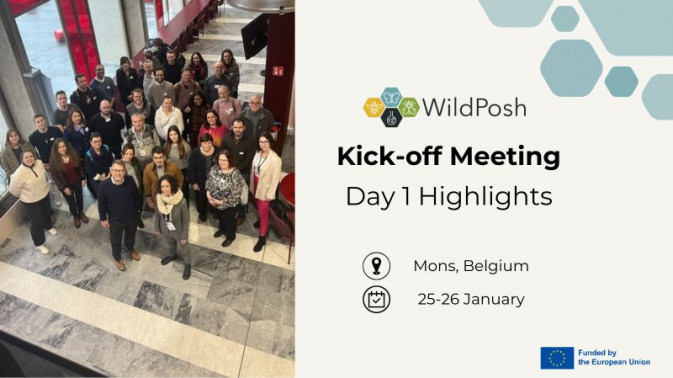WildPosh kicks off in Mons, Belgium: assessment, monitoring, and mitigation of chemical stressors on the health of wild pollinators

WildPosh: Pan-European assessment, monitoring, and mitigation of chemical stressors on the health of wild pollinators, officially kicks off on 25 and 26 January. Project partners from across Europe met for the first time in Mons, Belgium and marked the beginning of a 4-year endeavour. During the two days of the meeting, the partners had the chance to discuss objectives and strategies and plan their work ahead.
The newly EU-funded Horizon Europe project is a multi-actor, transdisciplinary project whose overarching mission and ambition are to significantly improve the evaluation of the risk to wild pollinators of pesticide exposure, and enhance the sustainable health of pollinators and pollination services in Europe.
The project is coordinated by the University of Mons and consists of 17 partners distributed in 10 European countries and has extensive experience in Research and Innovation projects under Horizon, as well as excellent knowledge of chemistry, modelling, nutritional ecology, proteomics, local stakeholders, environmental chemistry and nutritional biology.
Their combined expertise will allow WildPosh to achieve the five core objectives:
- Determine the real-world agrochemical exposure profile of wild pollinators at landscape level, within and among sites;
- Characterise causal relationships between pesticides and pollinator health;
- Build open database on pollinator traits/distribution and chemicals to define exposure and toxicity scenario;
- Propose new tools for risk assessment on wild pollinators;
- Drive policy and practice.
The first day of the kick-off meeting started with a warm welcome from project coordninator Prof. Denis Michez (UMONS) and an introductory presentation, giving an overview of goals, objectives and actions for the next 4 years. The rest of the day was dedicated to the work packages, their tasks and objectives.
-
WP1: A monitoring scheme to determine sources and routes of pesticide exposure in еnvironmental compartments/matrices
-
WP2: Effects of exposure to single pesticides single exposure and their mixtures on wild pollinators as novel models in laboratory and semi-field experiments
-
WP3: Omics of pesticide responses in pollinators
-
WP4: Data curation and in silico modelling for risk assessment
-
WP5: Integrated systems-based risk assessment
-
WP6: Assessing the effectiveness and feasibility of mitigation measures
-
WP7: Communication, knowledge exchange and impact
-
WP8: Project Management and Scientific Coordination
-
WP9: Ethics requirements
A special contribution came from Andreas Gumbert (DG ENV), Sofie Hofkens (DG SANTE) and Sofie van de Woestijne (REA/EC) who brought attention to the pesticides policy, project implementation and interactions with the European Research Executive Agency (REA), the Directorate-General for Environment (DG ENV) and the Directorate-General for Health and Food Safety (DG SANTE).
The second day started with work package discussions, which allowed the partners from different institutions to get together and create a plan with actions and a timeline. After that, WP leaders presented the results to the whole consortium.
A special guest was Prof. Christopher J. Topping (Aarhus University), coordinator of our sister-project PollinERA Project, who joined the Kick-off meeting online. Prof. Topping provided an overview of their objectives, methods and target outcomes. He also shared that there are a lot of flexible aspects and different focuses that will create space for collaboration and joint activities between the two projects. Building a synergy this early on will allow us to maximise impact and ensure the sustainability of results!
The day continued with fruitful discussions over other important aspects such as internal communication, organisation, ethics and data management, presented by our project manager Sara Reverté Saiz (UMONS).
During the two days, the WP leaders also got the chance to participate in interviews and explain more about their work. Stay tuned for the upcoming short introductory video!